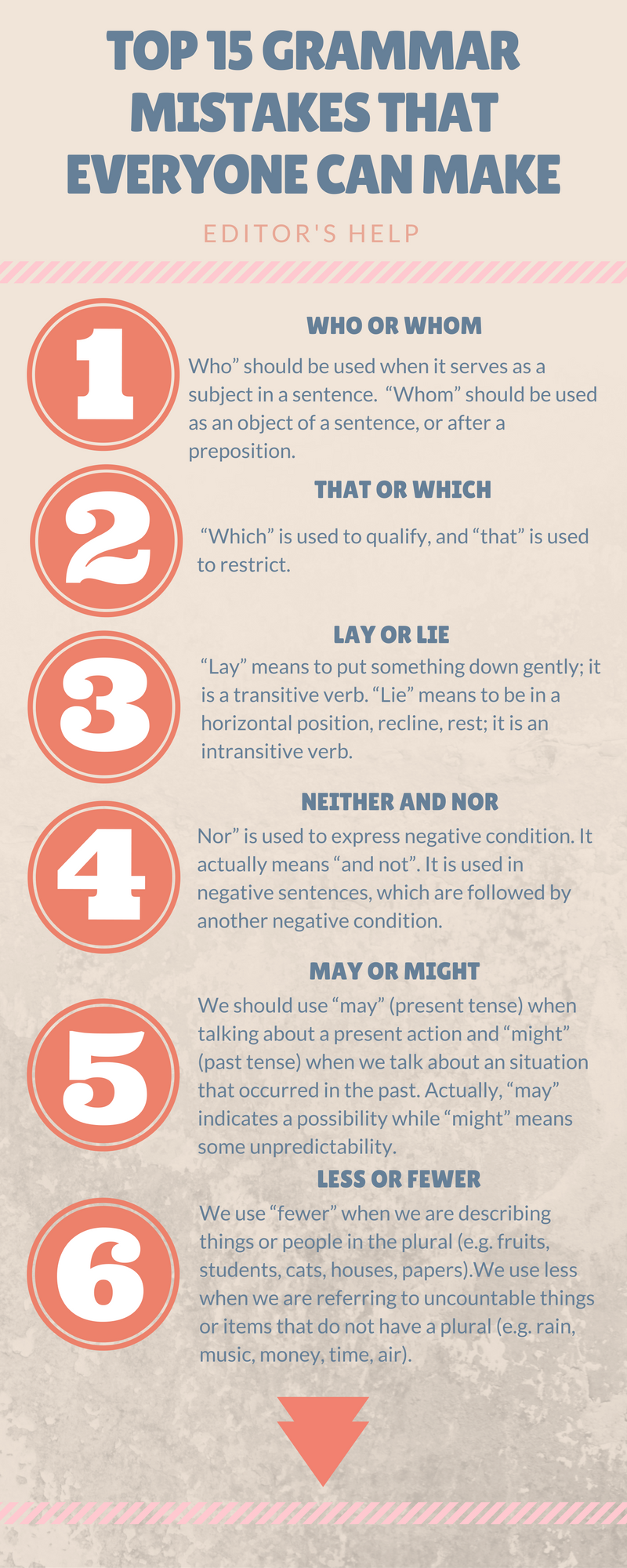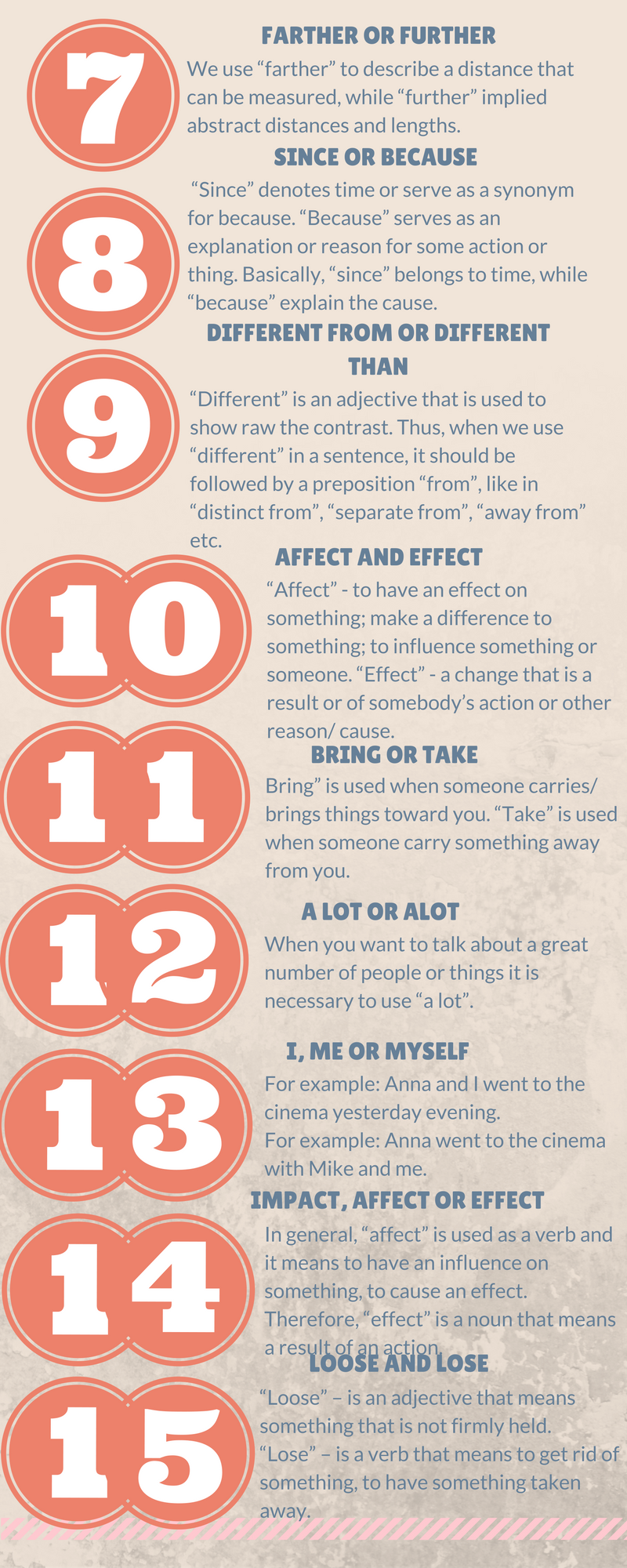Top 15 grammar mistakes that everyone can make
Possessing good knowledge of grammar is very important for everyone, no matter how you are going to use it in your life. You may write professional articles or be a student at University – proper grammar really matters. For this post, GetEssayEditor.com created a list of the most widespread grammatical mistakes people usually make.
Everyone can make a mistake that can cost you your reputation. Any reader can blame your ignorance and judge your intelligence. Have you ever wondered when do we use “Who” or “Whom”, “what” or “which”? You should not be a professional writer to know these rules. As a student, it is important to know the basic rules of English grammar to use them properly in writing. The knowledge of grammatical rules and most common mistakes can make your writing skills stronger. You will be able to use it for work or in your personal purposes.

1.Who or Whom
English grammarians have a lot of disputes about the rule when we should use “who” and when we should use “whom”. According to the rules, “who” is a subjective pronoun, as well as he, she, it, we, they. “Who” should be used when it serves as a subject in a sentence. “Whom” is an objective pronoun, as well as her, him, it, us, them. That is why “whom” should be used as an object of a sentence, or after a preposition. You should choose “who” or “whom” in accordance with a reference to a subject or object in a sentence. When you cannot choose what to you, you may replace “who” with another pronouns, for example he or she.
Examples:
Who made this cake? (In this case, who serves as a subject)
Whom do you think we should blame in this murder? (In this case, whom serves as an object of ‘blame’)
To whom would you like to call? (In this case, whom is following the preposition ‘to’)
2. That or Which
Have you ever wondered when we should use “which” or “that” in writing? This is one of the most widespread mistakes among students. If you know the rule about restrictive and nonrestrictive relative clauses, you will easily learn whether to use “which” or “that”. “That” is a restrictive pronoun. It is also called defining. It belongs to the referring noun.
For example: She held out the pen that was lost.
In the previous sentence, “that” is opening a restrictive relative clause. This clause contains the main information about the noun.
There is another type of relative clauses - nonrestrictive ones. “Which” is used in a nonrestrictive relative clause. This clause contains additional information that can be even avoided or left out of the sentence and it will not affect its meaning or structure.
For example: A list of ingredients in the cookbook would have made it easier to prepare the turkey, which also lacks pictures.
Thus, we can make a conclusion that “which” is used to qualify, and “that” is used to restrict. But, be careful and do not mix these two words.
3. Lay or Lie
It is quite difficult to choose whether to use “lay” or “lie” in a sentence. First of all, we should clarify that these words are irregular verbs. Choosing between these two verbs is quite challenging, because we can misuse them while speaking. Thus, we automatically hear and write down the wrong verb. It is really difficult to point out this mistake while we are proofreading the text.
“Lay” means to put something down gently. Since “lay” is a transitive verb, it requires a direct subject or object after it. The present tense of this verb is “lay”, the past tense is “laid”.
For example: I always lay my phone on the bedside table. Yesterday I laid my phone under the pillow.
“Lie” means to be in a horizontal position, recline, rest. Lie is an intransitive verb, so it does not need a direct object after it. The present tense of this verb is “lie”, the past tense is “lay”.
For example: Several apples lie on the dinner table. Two apples lay on the table yesterday.
These two verbs are often misused when the author uses the transitive verb “lay” when he needs to use the intransitive verb “lie”.
4. Neither and Nor
“Nor” is used to express negative condition. It actually means “and not”. It is used in negative sentences, which are followed by another negative condition.
For example: Neither my mother nor me felt sick that morning. It means that we both held the same negative condition.
Remember, when we use “neither” in a sentence which is followed by “nor”, we must ensure that the both halves of a sentence mirror each other.
5. May or Might
We use both “may” and “might” to express the possibility. What is the difference between the usage of the “may” and “might”?
Some rules explain that we should use “may” (present tense) when talking about a present action and “might” (past tense) when we talk about an situation that occurred in the past.
For example:
I may leave office early if I feel sick. (The present tense)
He might have left office before I came to work. (The past tense)
Actually, it is known that “may” indicates a possibility while “might” means some unpredictability.
For example:
You may get sick if you go outside without hat. (This sentence means a possibility of getting sick)
You might win a ticket to the movie if you fill out this registration form. (This sentence means a slight possibility of getting a ticket)
6. Less or Fewer
Students usually misuse these two words and do not know when to use “Fewer” and when to use “Less” in the sentence. We use “fewer” when we are describing things or people in the plural (e.g. fruits, students, cats, houses, papers).
For example:
Students write fewer tests at the beginning of the year. People tend to buy fewer products that contain a lot of fats. Fewer students passed the test.
We use less when we are referring to uncountable things or items that do not have a plural (e.g. rain, music, money, time, air).
For example:
I wish I could spend less money on groceries. People want to spend less time at work.

7. Farther or further
We use “farther” to describe a distance that can be measured, while “further” implied abstract distances and lengths.
For example:
My brother lives farther than sister. This issue should be resolved to avoid further problems.
Remember, that the same rule works for “the farthest” and “the furthest”.
We use “Since” as an adverb or a conjunction. It can denote time or serve as a synonym for because. “Because” is a conjunction which serves as an explanation or reason for some action or thing. Basically, “since” belongs to time, while “because” explain the cause.
For example:
Since I graduated I have married and had 3 kids. Because I graduated, I have a good job.
9. Different From or Different Than
It is a quite challenging rule for many students. Some words, for example “rather” and “faster” serve as a comparative adjectives and they require a preposition than.
For example: less than, greater than, rather than, faster than, etc.
“Different” is an adjective that is used to show raw the contrast. Thus, when we use “different” in a sentence, it should be followed by a preposition “from”, like in “distinct from”, “separate from”, “away from” etc.
For example:
My salary in the previous company was different from current position.
We use “different” with a conjunction “than” in rare cases.
For example:
The price for a flat rent is different in Austin than in New York.
But when we are not sure about the conjunction, it is better to use preposition “from”.
10. Affect and Effect
The last and the easiest rule to remember is that “affect” is used as a verb in writing, and “effect” is a noun. “Affect” and “effect” have different meaning, however these words are usually confused.
For example:
Junk food may negatively affect your health and mood. Junk food has negative effect on your health, especially heart.
“Affect” - to have an effect on something; make a difference to something; to influence something or someone.
“Effect” - a change that is a result or of somebody’s action or other reason/ cause.
11. Bring or take
These two words have totally different meanings but people can easily confuse them. “Bring” is used when someone carries/ brings things toward you. “Take” is used when someone carry something away from you.
For example: Bring this documents to my office, please.
Please, take this paper to our HR manager.
12. A lot or alot
Most students make a mistake and use “alot” instead of “a lot” when they are trying to describe a great number/ deal of something. Remember, when you want to talk about a great number of people or things it is necessary to use “a lot”. Fortunately, Microsoft Word Spellcheck will help you to detect this mistake immediately!
For example: There is a lot of space for a new bed. A lot of people want to live in New York.
13. I, me or myself
Students usually feel confused when they need to talk about themselves along with other people. Usually , we put other person’s name at the beginning of a sentence and then we refer to ourselves.
For example: Anna and I went to the cinema yesterday evening.
But when we should use this combination of words at the end of a sentence, we usually get puzzled. Remember, the usage of “I” is insufficient in this case, because we should use “me” instead.
For example: Anna went to the cinema with Mike and me.
As for “myself”, we use it only when “me” and “I” sound cumbersome. For example: “I keep it for myself”. Usage of “I” would sound awkward.
14. Impact, affect or effect
Have you noticed that the word “impact” instead of “affect” became ever-present, for example: “The absence of sleep greatly impacted my health”. The previous sentence is incorrect, because the verb you need is “affected”. The word “impact” is to be used only as a noun in a sentence.
Let’s imagine that you have perfectly learned the difference between “effect” and “affect” and want to use “impact” just to be on the safe side. Of course, everything is possible and language changes over time. In general, “affect” is used as a verb and it means to have an influence on something, to cause an effect. Therefore, “effect” is a noun that means a result of an action.
15. Loose and lose
First of all, we should outline the difference between these two words.
“Loose” – is an adjective that means something that is not firmly held.
“Lose” – is a verb that means to get rid of something, to have something taken away.
For example: She likes to wear a loose pony tail.
I do not want to lose my money.
Remember, grammar learning is very challenging and time-consuming task. If you feel bored with Emglish grammar, take advantage of our professional editing service. You are welcome to Contact us in Live Chat and consult with our support agents.
